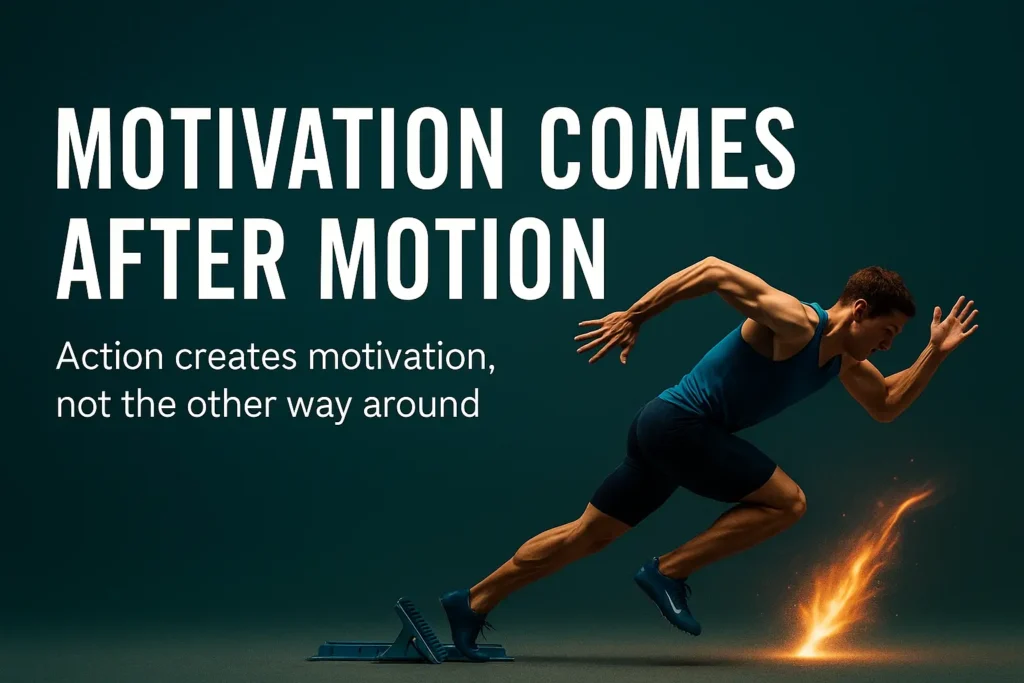Motivation Coaching | Why Motion Comes Before Motivation
Most of us have been told that motivation is the secret ingredient to success — that if we could only find the willpower, everything else would follow. But the truth is different. Motivation isn’t the cause of action. It’s the effect. When you act first, motivation follows.
At Accountability Coaching London , we work with self-starters who stall — people who don’t need more ideas, but a process that gets them moving when inner resistance sets in.

In this article you will learn:
- Why motivation is often misunderstood as a driver, not an outcome
- How behavioural psychology explains inner resistance and avoidance
- How accountability coaching creates the motion that motivation builds on
- Practical steps to turn resistance into momentum
The Myth of Motivation
We’re often told to “find motivation” before starting. Yet research in behavioural psychology shows this sequence is backwards. Waiting for motivation can create a self-fulfilling stall. You delay, avoid, and wait for a feeling that never arrives. The truth: action precedes motivation. By acting, you trigger neurological and emotional shifts that reinforce the behaviour.
At its simplest, motivation is momentum remembered. The key is to move first.
Learn more about how we approach motivation and change in our About page.
Inner Resistance Explained
Inner resistance isn’t laziness. It’s avoidance. Emotional discomfort — fear of failure, perfectionism, or overwhelm — leads the brain to seek short-term relief. This might look like scrolling, tidying, or over-preparing. These behaviours offer momentary comfort but deepen long-term resistance.
As explored in coaching for self-sabotage, resistance thrives when hidden, unacknowledged, or mislabelled as lack of discipline. Recognising it as a psychological loop is the first step in breaking it.
Behavioural Psychology in Action
Behavioural psychology explains why starting feels harder than continuing. The brain discounts future rewards and prefers immediate relief. That’s why avoidance feels so tempting, even when you know it harms progress.
When applied to coaching, these insights become practical. Structures like small deadlines, micro-commitments, and reframing discomfort as progress help dismantle avoidance. Read more about behavioural psychology in coaching.
Accountability Creates Motion
Accountability adds an external trigger to start. It transforms intention into action by creating expectation, evaluation, and ownership. You don’t move because you feel motivated. You move because someone is there, waiting, noticing, and holding you to your word.
Our framework at Accountability Coaching London shows how accountability coaching works in practice: daily activation calls, weekly coaching, and structured check-ins. These methods bypass waiting for motivation and instead create consistent forward motion.
From Stalling to Starting
For many, the hardest part is not the work itself but beginning. In Barnet, as in other London boroughs, clients often describe the same pattern: they know what to do, but can’t make themselves do it. The moment of starting feels like a wall.
By introducing accountability structures, even small starts lead to momentum. Over time, these small wins compound into sustainable progress. See how our Barnet coaching page illustrates this process.
Building Sustainable Motivation
Motivation is best understood as an after-effect of consistent motion. You don’t wait to feel motivated to start. You start, and motivation arrives as reinforcement. By building reliable structures — deadlines, check-ins, and identity-aligned goals — motivation becomes self-sustaining.
Explore more in our article on how to finish what matters.
Additional Reading on Motivation and Accountability
Looking to go deeper? Explore:
- Focus & Follow-Through — practical strategies to stay consistent.
- Coaching for Self-Sabotage — uncover hidden resistance loops.
- Behavioural Psychology in Accountability Coaching — how psychology supports sustainable progress.
FAQs on Motivation and Accountability
Does motivation coaching really work?
Yes — but not in the way people expect. Coaching helps you act first, knowing motivation will follow.
How is motivation different from willpower?
Motivation is emergent. Willpower is effortful control; motivation is momentum created by consistent action.
What if I keep stalling even with coaching?
That’s exactly what coaching addresses. Accountability removes the reliance on feelings and replaces them with structures that trigger motion.
Is this approach relevant only for professionals?
No. While our focus is high-achievers, anyone who struggles with resistance can benefit from coaching structures.
How quickly can I expect results?
Most clients notice change within weeks. The shift happens when you experience action leading motivation, not the other way around.
Take the Next Step
If you’ve been waiting for motivation, you may be waiting forever. The truth is simple: start moving, and motivation will follow.
👉 Explore our accountability coaching services and discover how structured support can help you finish what matters.